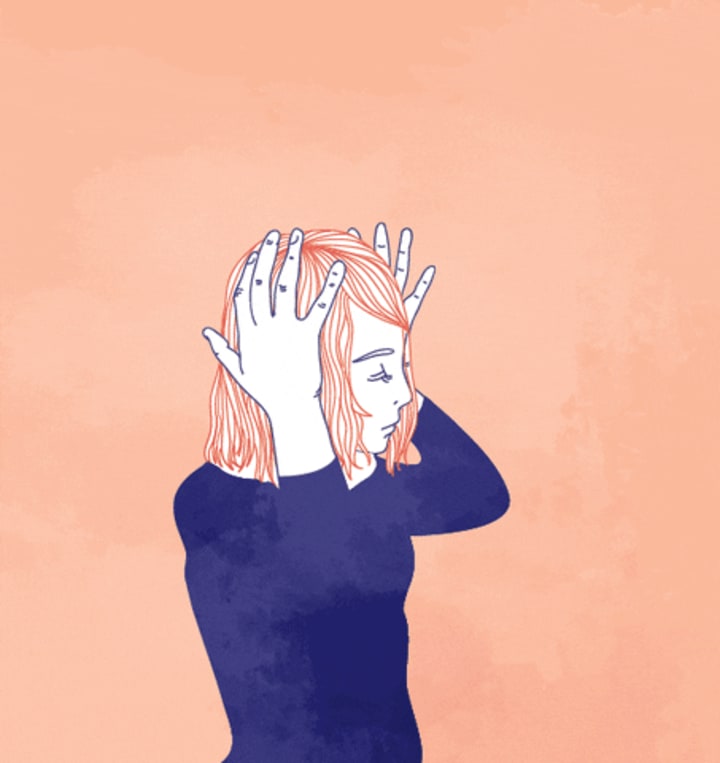There's No Such Thing As Common Knowledge
Common agreement, maybe.

There can’t be a 'common knowledge' without a common viewpoint.
To have a common viewpoint, humanity would have to be one large single-cell organism. To my knowledge (at least from my viewpoint), we’re not!
We all have our own set of eyes on the world. Our own brains interpreting the stimuli we see.
In fact, there is zero evidence to suggest that any single human sees the world the same way any other human does.
All we know without a doubt is that we come to a common agreement. Evolutionarily, 'common agreement' makes sense, since we’ve always been stronger in packs.
Even our entire economy is built upon a symbol that we all agree is valuable (ie. the dollar, euro, bitcoin, etc.).
We also all agree that hearts are red, the sky is blue, and the grass is green.
We’ve all labeled them accordingly and agreed on these labels.
But what does ‘blue,’ ‘red,’ or ‘green’ actually mean to us?
How would you describe the color of red to someone who is colorblind?

Keep in mind — merely mentioning the items that are red certainly wouldn’t communicate the experience… Someone who’s colorblind sees the same items, within their own colorblind experience.
So how do you explain the experience of seeing red?
Maybe you can talk about how the color red makes you feel? That would certainly go further in terms of illuminating the experience, but it points out something else as well…
Your experience of any color is yours and yours alone.
You can describe it and maybe find people who use similar terms for their own experience, but you will never be able to objectively compare the experiences.
You will never be able to remove your viewpoint from the equation.
So you will also never be able to truly see from someone else's viewpoint.
Even your experience of another face is uniquely your own experience of seeing that face.
The above article, on the perception of beauty, cites psychological experiments that support our own creation of a subjective reality.
No one truly knows anyone else’s viewpoint.
In general, we all take for granted how “clear” or “obvious” something is, merely because it is “clear” and “obvious” to us.
That limitation will have a myriad of effects on our reality and can be analyzed from many different perspectives. For the purposes of this article, I will focus on five potential viewpoints:
- Philosophically and Morally
- Perceptually
- Paradoxically
- Socially
- Cerebrally
Philosophically and Morally
Dan Garro provides a detailed analysis of perspective from a philosophical standpoint.
“You cannot have truth without first choosing a standpoint.”
-- Dan Garro
Dan shares insight from renowned philosophers and effectively illustrates how we must all open up to new perspectives and standpoints.
Our own standpoint is not the only standpoint.
It's also not enough.
The philosophical greats knew they had to argue and defend their ideas in order to better understand them.
It’s only in seeing and understanding more viewpoints that we can establish and agree on a moral code, grow as intellectual human beings, and gain an ethical understanding of the world.
Perceptually
Alisia provides and details a very clear breakdown of one particular unit – the unit of language – across some systematized interpretations of various localized viewpoints (ie. cultures).
In this article, Alisia thoroughly digs into exactly how specific language constructs affect people's interaction with their respective environment and sense of reality.
Language is yet another aspect of life we take for granted, yet it’s one of the major building blocks of both our perspective and our group decisions.
We view the power of being able to speak with one another as unifying.
But how do we ever truly know if any two viewpoints are alike? Just because they agree on the terms and say they’re alike?
Paradoxically
Francesca Devon Heward cleverly points out how language and its interpretations might not be unifying us at all.
In her article on the paradox of language, she illustrates how words are often far removed from their original meaning.
In much the same way colors and feelings are unique to our experience, so is our experience of reading a book or an article. Everything we take from it, what we see in our mind’s eye, what we envision – it's all ours and ours alone.
The author's original intent can easily be lost as we reinterpret the words based on what those words mean to us.
...How illusive writing becomes when we see it from that standpoint.
How can we ever hope to get a certain idea or viewpoint across in such a specific way that it can survive all those levels of reintegration?
Maybe it's the point that we can't. Maybe we're only meant to share our own unique experiences insofar that they get absorbed into a coalescence. A group mind, so to speak.
Either way, the very unit of language capable of unifying us via conversation is also distancing us, giving us the illusion of understanding one another, just enough to uphold our own viewpoint even further… Therein lies the paradox.
Paradoxes are most often considered to be impossibilities. The Grandfather paradox, for example, has been cited in relation to how time-travel can’t be possible. (How could you go back in time and kill and/or become your own Grandfather? It’s madness!)
But in reality, a paradox is just the illumination of a limit or boundary to our perspective.
For example, we might want to believe that everything someone says is true, but what if they say, “Everything I say is a lie”? Well, everything can’t be a lie then because the aforementioned statement would be true. But if that very statement was true, then not everything that person says is a lie… So the statement can't be true... But then...

We wind up in a loop because we can’t use our current parameters to fully understand the example presented. Our parameters of defining “truth” and “lie” as opposites fail us in this one circumstance, so we either (1) descend down that never-ending loop in relation to this one circumstance or (2) we step back and rethink our staunch definitions of the words "truth" and "lie."
(Or, the more likely option, (3) we ignore the paradox entirely and go on with our lives, keeping our staunch definitions of the world intact.)
Socially
Much of our evolution can be ascribed to the importance of belonging to a pact. We created myths, told stories, and it let us bond and belong to a tribe.
For centuries, this is how we survived.
Today, we’re facing down the other side of the pendulum — for if we use our pact mindset to hide from growth and redefining our parameters, it might very well be the pact mindset that tears us apart.
Groupthink has long been a psychological term ascribed to some of the worst times in history, whether defined by riots, wars, or peer pressure. It's a group mindset in which individual values often get lost.
Groupthink can be pleasant during times of trauma because it can lessen personal responsibility. And in our modern world, we’ve been processing a lot of trauma… the Atlanta spa shootings, the Insurrection at the Capitol, the racial injustice evidenced by the tragic deaths of George Floyd, Breonna Taylor, Ahmaud Arbery, and others, police brutality, a global pandemic, climate change, and more…
…So much more!
All played out in an increasingly polarized media landscape.
This polarization is happening because there’s a feedback loop. Media outlets profit from providing what their viewers want, but many viewers want to stay nice and cozy in their comfort zone.
They seek out a supportive pact-mentality, not by trying to understand someone else's perspective, as Dan Garro pointed out was so vital, but by finding the group that lets them remain comfortably within the illusion that their own viewpoint is, in fact, the only one they need.
The myth of common knowledge makes viewers feel safe. Because then, nothing has to change.
But if we stick to our camps and remain within our comfortable bubble, we won’t grow.
We need to work against the small-scale pact mindset and expand.
It’s time for our pact mindset to use a new scale – a world-sized one – which might require some cerebral rewiring.
Cerebrally
In order to pull us back from one extreme of the pendulum, a cerebral rewiring that de-emphasizes and even challenges our social integration might actually be an evolutionary development.
Rachel Hill breaks down one particular perspective of the world, one that many people are still bent on calling a "disease" merely because social hardships often result.
It might be a blessing that some of us think differently.
It might also be a blessing that neurodiversity has more representation today than ever, with shows like Atypical and Everything’s Gonna Be Okay.
It might be a blessing because finally, new viewpoints are being given the power and platform to find their own social acceptance in the world.
(And if I was right that cerebral social challenges might have an evolutionary purpose, then its purpose is to actually increase the strength of our social connections... Another paradox!)
In the end, we all stand to benefit from learning their truth.
The barriers that prioritize “fitting in” at the expense of compassion need to come down.
How?
Listen. Read. Write.
Work to expand the group coalescence, to make it more inclusive of every individual. Let's stretch the group-mind across the planet, without giving in to a groupthink devoid of individualism.
That's kinda like working out a muscle, without letting its soreness and pain discourage us.

We’ll never truly understand anyone else’s story, but if we try, we can and will expand and enrich our own.
First, we must acknowledge that our knowledge isn’t common at all.
We must seek out the knowledge we see as uncommon.
And we must share all that we assumed was common so that we can stand more firmly in our own uncommon truth and grow taller with the truth of others.
~*~*~*~
There are multiple valuable perspectives on how our own perspective is not enough. As such, I could not possibly convey this point with only my own perspective... Hence, I chose to specifically share a few of the many writers that inspire me, to help illustrate how they expanded my perspective with a perspective of their own. And how I and my article were made better for it.
If you enjoyed this article, please share the link, like it, or leave a tip! You can also help me continue to expand my viewpoint with your own (and vice versa) by reaching out and following me on Twitter.
About the Creator
Casara Clark
I was a dark chocolate enthusiast before it was cool.






Comments
There are no comments for this story
Be the first to respond and start the conversation.